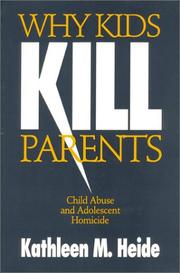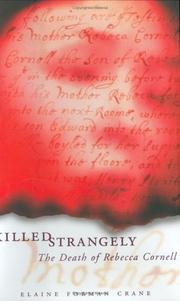| Listing 1 - 7 of 7 |
Sort by
|
Book
ISBN: 2847341013 9782847341010 Year: 2004 Publisher: Paris Tallandier
Abstract | Keywords | Export | Availability | Bookmark
Book
Year: 1959 Publisher: Paris Soc. d'éd. " Les Belles Lettres "
Abstract | Keywords | Export | Availability | Bookmark
 Loading...
Loading...Choose an application
- Reference Manager
- EndNote
- RefWorks (Direct export to RefWorks)
Book
ISBN: 1349949973 1349949965 Year: 2018 Publisher: London : Palgrave Macmillan UK : Imprint: Palgrave Macmillan,
Abstract | Keywords | Export | Availability | Bookmark
 Loading...
Loading...Choose an application
- Reference Manager
- EndNote
- RefWorks (Direct export to RefWorks)
This book combines the approaches of history and criminology to study parricide and non-fatal violence against parents from across traditional period and geographical boundaries, encompassing research on Asia as well as Europe and North America. Parricide and non-fatal violence against parents are rare but significant forms of family violence. They have been perceived to be a recent phenomenon related to bad parenting and child abuse often in poorer socioeconomic circumstances – yet they have a history, which provides insights for modern-day explanation and intervention. Research on violence against parents has concentrated on child abuse and mental illness but, by using a rich array of primary and secondary documents, such as court cases, criminal statistics, newspaper reports, and legal and medical literature, this book shows that violence against parents is also shaped by conflicts related to parental authority, the rise of children’s rights, conflicting economic and emotional expectations, and other sociohistorical factors.
History. --- Europe --- Social history. --- Crime --- History of Early Modern Europe. --- Social History. --- Crime and Society. --- History of Modern Europe. --- History of Medieval Europe. --- History—1492-. --- History—476-1492. --- Sociological aspects. --- Parricide. --- Parents --- Violence against. --- Families --- Matricide --- Patricide --- Homicide --- Europe-History-1492-. --- Crime—Sociological aspects. --- Europe-History-476-1492. --- Descriptive sociology --- Social conditions --- Social history --- History --- Sociology --- Europe—History—1492-. --- Europe—History—476-1492.

ISBN: 0803970609 9780803970601 Year: 1995 Publisher: London ; Newbury Park, CA : Sage Publications,
Abstract | Keywords | Export | Availability | Bookmark
 Loading...
Loading...Choose an application
- Reference Manager
- EndNote
- RefWorks (Direct export to RefWorks)
Parricide --- -Adolescent psychotherapy --- -Problem families --- -Family violence --- Dysfunctional families --- Family violence --- -Adolescent psychiatry --- Psychotherapy --- Domestic violence --- Household violence --- Interparental violence --- Intrafamily violence --- Violence --- Families at risk --- Families with problems --- High-risk families --- Multiproblem families --- Problem families --- Problem family --- Troubled families --- Families --- Matricide --- Patricide --- Homicide --- Adolescent psychotherapy --- Adolescent psychiatry --- Parricide - - United States --- Adolescent psychotherapy - - United States --- Problem families - - United States --- Family violence - - United States --- CRIMINOLOGIE --- VICTIMOLOGIE --- PARRICIDE --- DELINQUANTS --- ENFANTS --- VIOLENCE
Book
ISBN: 0195176669 0199721041 9780199721047 129971210X 9781299712102 9780195176667 0190237376 Year: 2013 Publisher: Oxford New York
Abstract | Keywords | Export | Availability | Bookmark
 Loading...
Loading...Choose an application
- Reference Manager
- EndNote
- RefWorks (Direct export to RefWorks)
This study is about juvenile and adult sons and daughters who kill their parents. It moves far behind the statistical correlates of parricide by synthesizing the professional literature on parricide in general, matricide, patricide, double parricides, and familicides. The book explains the reasons behind the killings and includes in-depth discussion of issues related to prosecuting and defending parricide offenders. The book is enriched with its focus on clinical assessment, case studies, and follow-up of parricide offenders, as well as treatment, risk assessment, and prevention.
Parricide. --- Family violence. --- Abused children. --- Mentally ill children --- Juvenile homicide. --- Parricide --- Family violence --- Abused children --- Juvenile homicide --- Juvenile murder --- Youth homicide --- Conduct disorders in children --- Homicide --- Emotionally disturbed children --- Psychotic children --- Child psychiatry --- Child psychopathology --- Developmentally disabled children --- Sick children --- Battered children --- Child abuse victims --- Maltreated children --- Victims of child abuse --- Children --- Victims of crimes --- Adult child abuse victims --- Child abuse --- Domestic violence --- Household violence --- Interparental violence --- Intrafamily violence --- Violence --- Matricide --- Patricide --- Treatment. --- Treatment
Book
ISBN: 1283277840 9786613277848 0520948734 9780520948730 9781283277846 6613277843 9780520260702 0520260708 Year: 2011 Publisher: Berkeley, Calif. London, England University of California Press
Abstract | Keywords | Export | Availability | Bookmark
 Loading...
Loading...Choose an application
- Reference Manager
- EndNote
- RefWorks (Direct export to RefWorks)
On an August evening in 1933, in a quiet, working-class neighborhood in Paris, eighteen-year-old Violette Nozière gave her mother and father glasses of barbiturate-laced "medication," which she told them had been prescribed by the family doctor; one of her parents died, the other barely survived. Almost immediately Violette's act of "double parricide" became the most sensational private crime of the French interwar era-discussed and debated so passionately that it was compared to the Dreyfus Affair. Why would the beloved only child of respectable parents do such a thing? To understand the motives behind this crime and the reasons for its extraordinary impact, Sarah Maza delves into the abundant case records, re-creating the daily existence of Parisians whose lives were touched by the affair. This compulsively readable book brilliantly evokes the texture of life in 1930's Paris. It also makes an important argument about French society and culture while proposing new understandings of crime and social class in the years before World War II.
Women murderers --- Murder --- Women --- Social conditions --- Nozière, Violette, --- Paris (France) --- 1930s. --- class. --- crime. --- criminology. --- detective. --- europe. --- fascism. --- female murderers. --- feminism. --- france. --- gender and sexuality. --- gender studies. --- history. --- imprisonment. --- insanity defense. --- insanity. --- interwar paris. --- law and society. --- madness. --- matricide. --- media studies. --- mental illness. --- murder. --- mystery. --- nonfiction. --- paris. --- parricide. --- patricide. --- poison. --- politics. --- poverty. --- prison. --- respectability. --- scandal. --- sensation. --- social class. --- social history. --- transgression. --- trials. --- true crime. --- violence. --- working class. --- Noziere, Violette,

ISBN: 0801471443 1322522650 0801471451 9780801471452 0801440025 9780801440021 9780801475276 0801475279 9780801471445 9781322522654 Year: 2015 Publisher: Ithaca, NY
Abstract | Keywords | Export | Availability | Bookmark
 Loading...
Loading...Choose an application
- Reference Manager
- EndNote
- RefWorks (Direct export to RefWorks)
"It was Rebecca's son, Thomas, who first realized the victim's identity. His eyes were drawn to the victim's head, and aided by the flickering light of a candle, he 'clapt his hands and cryed out, Oh Lord, it is my mother.' James Moills, a servant of Cornell . . . described Rebecca 'lying on the floore, with fire about Her, from her Lower parts neare to the Armepits.' He recognized her only 'by her shoes.'"-from Killed Strangely On a winter's evening in 1673, tragedy descended on the respectable Rhode Island household of Thomas Cornell. His 73-year-old mother, Rebecca, was found close to her bedroom's large fireplace, dead and badly burned. The legal owner of the Cornells' hundred acres along Narragansett Bay, Rebecca shared her home with Thomas and his family, a servant, and a lodger. A coroner's panel initially declared her death "an Unhappie Accident," but before summer arrived, a dark web of events-rumors of domestic abuse, allusions to witchcraft, even the testimony of Rebecca's ghost through her brother-resulted in Thomas's trial for matricide. Such were the ambiguities of the case that others would be tried for the murder as well. Rebecca is a direct ancestor of Cornell University's founder, Ezra Cornell. Elaine Forman Crane tells the compelling story of Rebecca's death and its aftermath, vividly depicting the world in which she lived. That world included a legal system where jurors were expected to be familiar with the defendant and case before the trial even began. Rebecca's strange death was an event of cataclysmic proportions, affecting not only her own community, but neighboring towns as well. The documents from Thomas's trial provide a rare glimpse into seventeenth-century life. Crane writes, "Instead of the harmony and respect that sermon literature, laws, and a hierarchical/patriarchal society attempted to impose, evidence illustrates filial insolence, generational conflict, disrespect toward the elderly, power plays between mother-in-law and daughter-in-law, [and] adult dependence on (and resentment of) aging parents who clung to purse strings." Yet even at a distance of more than three hundred years, Rebecca Cornell's story is poignantly familiar. Her complaints of domestic abuse, Crane says, went largely unheeded by friends and neighbors until, at last, their complacency was shattered by her terrible death.
Homicide --- Trials (Murder) --- Murder trials --- Murder --- Femicide --- Offenses against the person --- Violent deaths --- History --- Cornell, Rebecca, --- Cornell, Thomas, --- Briggs, Rebecca, --- Portsmouth (R.I.) --- Portsmouth, R.I. --- 1700's Rhode Island. --- American survey courses. --- Colonial Period. --- Colonial politics. --- Cornell incident. --- Elaine Forman Crane. --- Ezra Cornell. --- Narragansett Bay. --- Rebecca Cornell. --- Rhode Island society. --- Thomas Cornell. --- american genealogy . --- an Unhappie Accident. --- books about lizzy borden . --- books for true crime fans . --- cases of matricide . --- colonial America history . --- colonial America trial . --- colonial America true crime . --- colonial America. --- cornell history . --- crime victim's ghost. --- domestic abuse. --- evolving common law. --- ghost testimonies . --- historical murder trials . --- history buffs. --- legal history . --- legal system researchers. --- lizzy borden . --- matricide true crime . --- matricide. --- microhistory. --- morbid . --- murder mystery. --- murderinos . --- my favorite murder . --- narrative nonfiction . --- new england history . --- new england murders . --- new england true crime . --- nonfiction true crime . --- nonfiction. --- old cornell house . --- pheobe judge . --- portsmouth . --- portsmouth rhode island . --- real crimes . --- real murder stories . --- real murder trials . --- rhode island history . --- rhode island murders . --- rhode island trials . --- rhode island true crime . --- seventeenth-century life. --- sleuthing historian. --- stories like Lizzie Borden. --- testimony of a ghost. --- true 1673 murder mystery. --- true crime . --- true crime buff . --- true crime cases . --- true crime whodunit. --- whodunit. --- witchcraft . --- women's studies .
| Listing 1 - 7 of 7 |
Sort by
|

 Search
Search Feedback
Feedback About UniCat
About UniCat  Help
Help News
News